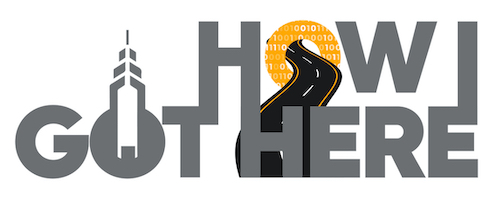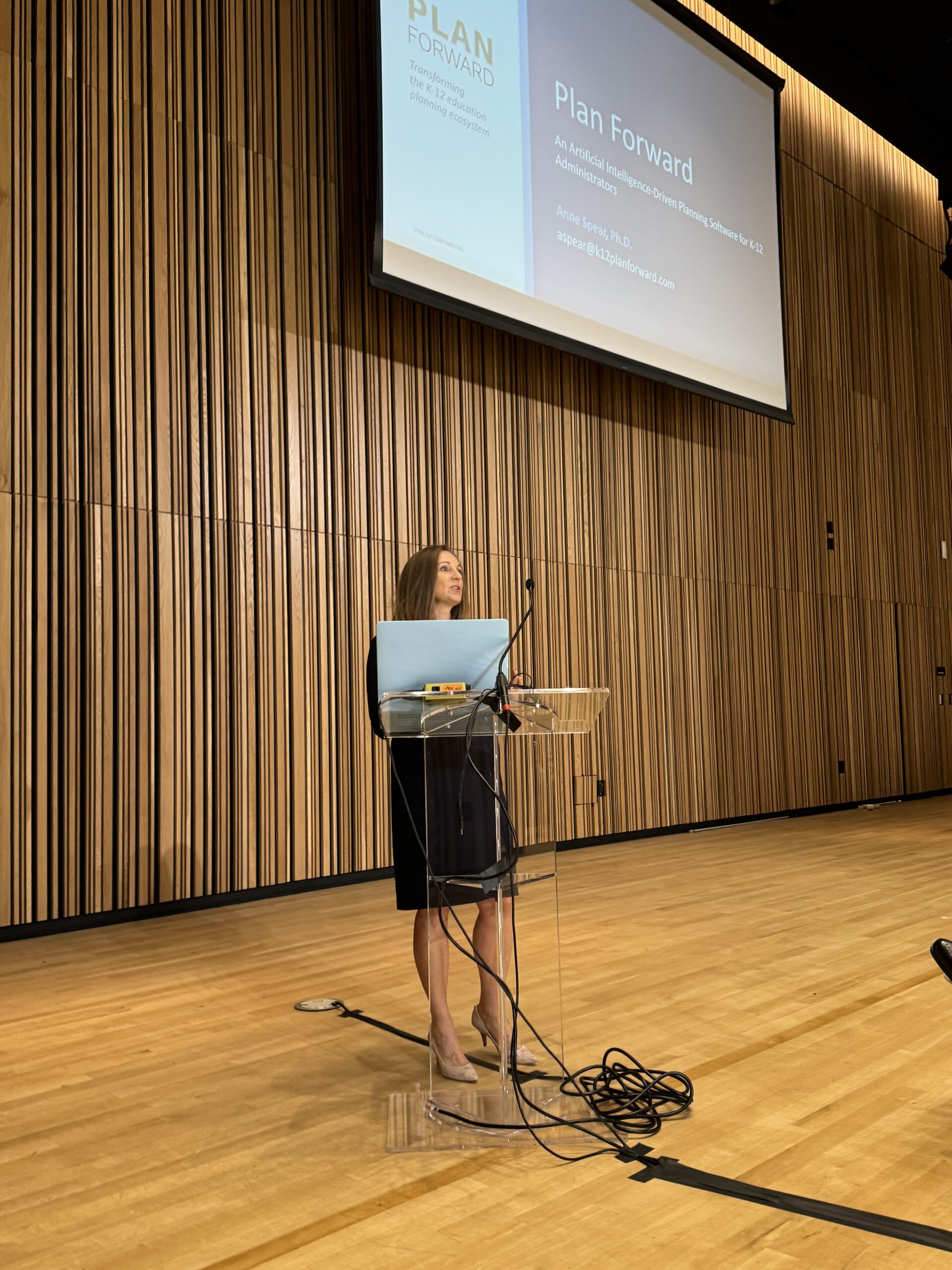
This is How I Got Here, a series where we chart the career journeys of technologists. Want to tell your story? Get in touch.
Anne Spear founded her startup 10 months ago, and she’s adamant she’s still figuring things out.
Plan Forward, an AI-driven software firm aimed at K-12 educational administrators, officially launched its main product in September. The tool aims to assess needs and monitor school program implementations through custom-made surveys. After completion, those surveys are then analyzed to create a report for education leaders.
“If our leaders aren’t doing a good job, it’s going to be hard for our teachers and students to follow suit,” Spear, the company’s founder and CEO, told Technical.ly.
For Spear, it’s a personal mission. She previously worked as a teacher before going into education consulting. She noted that a lot of edtech firms are popping up to help teachers, and rightfully so, but administrators need more support. That’s where Plan Forward comes in.
Spear delved into the world of bootstrapping Plan Forward, how working in education influenced her present and her joy in making the “privileged choice” of becoming a founder.
This Q&A has been edited for length and clarity.
Where were you before starting Plan Forward?
Most recently, I was a consultant supporting district leaders in their strategic planning process. I was working for an educational support vendor, Hanover Research, in Arlington. I put together resources for data collection, and then I would travel and work directly with district leaders to help them develop strategic planning committees. I would lead workshops for them to look at their vision, mission and values, and then we would dive into goal setting and strategies for their five-year plan.
What was your first role in education?
I started as a classroom teacher. While it doesn’t seem relevant, it really shaped my thinking. I started working with court-referred juvenile youth in Massachusetts and then did international work [in Burkina Faso]. … I became a classroom teacher in Miami Dade County Schools. It was a failing school.
My first year, I had to do a lot of work on myself. I wanted to give something better to my students. In order to control my classroom, I could easily shame [students] to sit in their seats, right? And I realized that that’s not what I wanted to do. I actually listened to [Marshall] Rosenberg’s “Nonviolent Communication” in order to learn how to talk with the kids in a way that they responded to and was helpful for their growth. I worked my butt off.
Plan Forward is really focused on administrators and leaders. They’re the unseen heroes, and it’s not seen how much they are doing. They’re doing just as much as teachers, but folks don’t see their work. They don’t understand them, so their budgets are slashed. They’re being asked to do more and more by the state educational departments. … My second year, a leader came in, the school principal, and he and his assistant principal changed the school. We went from an F to a C, and they did it through planning, setting goals and then being consistent and authentic with those goals.
One of my first conversations was with a male founder who has exited, [and] told me I wasn’t ready and then proceeded to try and recruit me. These conversations motivate me.
Anne Spear
They really changed the school culture, but what was missing was the evaluation of what we did. We changed my class to a computer class. The instruction [was now] on a computer. I’m making such a massive choice for my students and how they’re learning. I need to understand how that’s affecting them.
Whether you’re a superintendent, or reading coach, or a school administrator, or a teacher, you’re in triage day to day. You can’t do the planning.
How would Plan Forward have helped you when you were working in education?
It would have helped my administration by being able to understand how teachers are responding to the change — teacher retention. They would have been able to get really quick insights and understanding of student engagement, and then they’d be able to quickly do some measurements of the outcome.
It would have allowed them to get insights and document: How, in particular, did this really big decision work? And if we’re going to keep it next year, what do we have to do to make it more effective? To learn deeper?
What does your day-to-day as a founder look like?
I think every founder would relate that it’s all-consuming.
I’m in a learning curve of figuring out how to manage this type of stress and pressure. I’ve done a lot of hard things, so I know the cycle. I jump in at the deep end. It’s thrilling and exciting, exactly where I want to be. And then I’m in this stage where I’m in it to win it, but I’m not yet comfortable with it. We’re 10 months in, and that’s kind of where I’m at.
I knew going into this that I would need a lot of personal care, mental health balance. I’m an older founder. I’m a female founder. I’m single, which means that my support is different from other folks. My financial situation is different.
I have a morning routine. I’m an early riser. I do meditation, I do some work in the morning, and it’s also when my team is quiet. I’ll eat breakfast and take a walk, and then I’ll get sucked into work.
As a founder, inevitably, you have a team, and so your time is no longer your time. You’re there for your partners and clients, and you’re there for your team. When they need you, you’re there, which results in me being available at all times.
When we were about to launch our product, it was me and the dev team that was up until 11. As we make our first deliverables, it’s me and the content team that’s up until 11, and working on weekends.
If you ask my community, they would be the first to tell you I’ve become really unreliable, really flaky. I always compare it to when you become a new mother. All I think about and talk about is Plan Forward. You’re this new mother to this baby that you have to give full attention to all the time.
I work probably an easy 12-hour day, much longer most days, and it’s seven days a week.
If you offered my job back, I wouldn’t take it for anything. I can’t tell you how amazing these 10 months have been. It’s a grind, and I need to figure out how to take the pressure off, because there’s a lot of cognitive focus. But it’s a choice, and it’s a privileged choice and I love it. I would much rather be doing this.

How did the launch come to be, and where are you at with the product?
I wish every administrator could just see it and give feedback. We’re building something to help administrators, and if it doesn’t help them, we’re not interested in doing it.
I spent a lot of time cold calling for the last 10 months. I wanted to know that this was something that was needed, not just folks being nice. A lot of those that gave me feedback and advice are now becoming our clients and partners.
We’re on target to hit our end-of-year goals for sales and partnership. Right now, in September, we’re doing a planning partnership with folks to get started and get the feedback and get them into the system, so we’re delivering our first reports.
We want to make sure that administrators are getting what they need from the platform, which is saving time on what is required and getting feedback and insights. It has the extra potential of making an impact on the culture of planning and monitoring progress for continuous improvement.
We’re aimed at smaller districts. They’re priced out of anything else. It’s always going to be affordable to them.
How is fundraising going?
I’m in a game that I don’t belong.
We bootstrapped with a very, very modest friends and family [round]. When you invest in a startup, it’s the highest-risk investment: Most people do not understand it, and yet it’s high reward. It’s hard, because you’re going to folks, [and] they have to be prepared to lose it.
Even if there is access to capital, you want to think very carefully of these relationships, and if they’re comfortable or even understanding what type of investment you’re asking them to make. … Shout out to The Agora Initiative, the DC Tech [Meetup]. There’s been an amazing community to be able to be part of the networking community for when we’re ready to raise a pre-seed.
The issue with founders who are similar to me is that we have a bridge that we have to cross. That’s usually once you get to your product. We did a lot of split equity and hard work, and $35K from a modest friends and family to get a product for our first clients. You would think that we would be there, but we’re just entering a very rickety bridge. If we’re not successful in another friends and family raise, we won’t get over that bridge.
I’m in a learning curve of figuring out how to manage this type of stress and pressure. I’ve done a lot of hard things, so I know the cycle.
Anne Spear
In a couple of months, you might not be talking to us as Plan Forward — not because of our products, but because we have to find and access a relatively minimal amount of capital. But our traction is not enough for a traditional angel or VC. A lot of us don’t have easy capital.
One of my first conversations was with a male founder who has exited, [and] told me I wasn’t ready and then proceeded to try and recruit me. These conversations motivate me. As an entrepreneur, you cannot be worried about failure. And that took me a while. I cannot care about failure. I really, truly cannot.
I might not belong here, but I’m going to do it right. I’ve got to just be focused on those that I’m serving, and that’s the administrators.
Do you have any other advice to share with fellow founders?
What women go through is different. People don’t understand what a founder is going through. And then, if you don’t have somebody that’s on the couch or someone who understands that support, it can be really lonely.
I would go back and prepare for that and really think about, how do I communicate? I can’t show up for multiple reasons. I kind of suck as a friend in every way. But how do I get that support, especially since it’s isolating? You need your cheerleader. You get so bogged down. Again, you’re like that new mother, you look pretty ragged.
That piece would be what I go back and tell myself: That you need cheerleaders. I’m still figuring that out.







